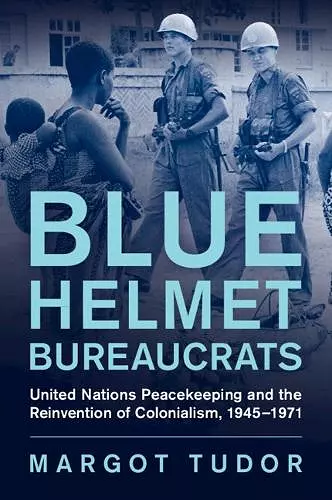Blue Helmet Bureaucrats
United Nations Peacekeeping and the Reinvention of Colonialism, 1945–1971
Format:Paperback
Publisher:Cambridge University Press
Published:6th Feb '25
Currently unavailable, and unfortunately no date known when it will be back
This paperback is available in another edition too:
- Hardback£85.00(9781009264921)

A history of colonial legacies in United Nations peacekeeping operations in the aftermath of the Second World War.
A history of colonial legacies in United Nations peacekeeping from 1945–1971, focusing on the influence of UN staff deployed to conflicts in the Global South. Margot Tudor identifies the unexplored colonial structures, racial prejudices, and organisational politics that shaped UN peacekeeping practices during the instability of decolonisation.This history of colonial legacies in UN peacekeeping operations from 1945–1971 reveals how United Nations peacekeeping staff reconfigured the functions of global governance and sites of diplomatic power in the post-war world. Despite peacekeeping operations being criticised for their colonial underpinnings, our understanding of the ways in which colonial actors and ideas influenced peacekeeping practices on the ground has been limited and imprecise. In this multi-archival history, Margot Tudor investigates the UN's formative armed missions and uncovers the officials that orchestrated a reinvention of colonial-era hierarchies for Global South populations on the front lines of post-colonial statehood. She demonstrates how these officials exploited their field-based access to perpetuate racial prejudices, plot political interference, and foster protracted inter-communal divisions in post-colonial conflict contexts. Bringing together histories of humanitarianism, decolonisation, and the Cold War, Blue Helmet Bureaucrats sheds new light on the mechanisms through which sovereignty was negotiated and re-negotiated after 1945.
'From the Sinai to Gaza, from the Congo to West Papua, Margot Tudor's Blue Helmet Bureaucrats exposes how United Nations peacekeepers inherited the practices and mindsets of colonial administration. Tudor's crisp account of the reality of liberal internationalism is revelatory for students of the United Nations and decolonization.' Timothy Nunan, University of Regensburg
'Margot Tudor is among the brightest of a new generation of historians illuminating a lost international past - in Blue Helmet Bureaucrats she sets her clear eyed vision on the problematic politics of UN peacekeeping in the post-Second World War. This thick history sets the complex truth above all else; we see the legacies of colonialism, the limits of good intentions, and the real humans involved.' Glenda Sluga, European University Institute
'Margot Tudor's account of the early years of UN peacekeeping reveals the power of mid-level UN intermediaries to limit the sovereignty of smaller postcolonial states, thus ensuring their alliance with a liberal internationalist order. Blue Helmet Bureaucrats provides a meticulously researched historical reckoning with the imperial origins of liberal internationalism.' Meredith Terretta, University of Ottawa
'Well researched and carefully written, Blue Helmet Bureaucrats is a stimulating read for specialists. … Recommended.' D. P. Forsythe, Choice
'Tudor's argument in this book is multifaceted, demonstrating the interdisciplinary commitment to both the insights of IR and international history. Each aspect of the argument provides an avenue from which further research can develop, both in terms of tracing key conceptual themes and delving deeper into historical phenomena.' Caroline Dunton, International Journal: Canada's Journal of Global Policy Analysis
'[A] vivid account of the formative years of UN peacekeeping practices.' Daniel R. Quiroga-Villamarín, Global Governance
'I loved this book for multiple reasons, but above all, because it shows how practices we consider 'humanitarian,' in fact, perpetuated power imbalances between former empires and their former colonies. It also helped me to think about the United Nations and its global role in new ways. Perhaps most importantly, it changed my understanding of international peacekeeping, showing that its history was often more violent than the name might imply.' Julia Irwin, Shepherd Books
'This book is an exemplar for historians seeking new approaches for understanding the Cold War, decolonization and multilateral institutions. It should be on the reading list for all those interested in the modern-day shortcomings of the UN, and the broader international system.' Hamish McDougall, International Affairs
'A stellar contribution to a growing literature that decenters the UN as an institution and encourages scholars to study how the UN acted in the world through field-based actors, rather than assuming the UN's power originated and acted solely within its highest echelons, such as the Security Council, General Assembly, and commissions.' Ryan Glauser, Cold War History
'As they consider the future of peacekeeping, diplomats and UN officials alike would do well to read this thought-provoking book by Margot Tudor … Using a critical lens, Tudor highlights gaps between the reality and rhetoric of peacekeeping operations …' Eugene Chen, International Peacekeeping
ISBN: 9781009264938
Dimensions: unknown
Weight: unknown
336 pages